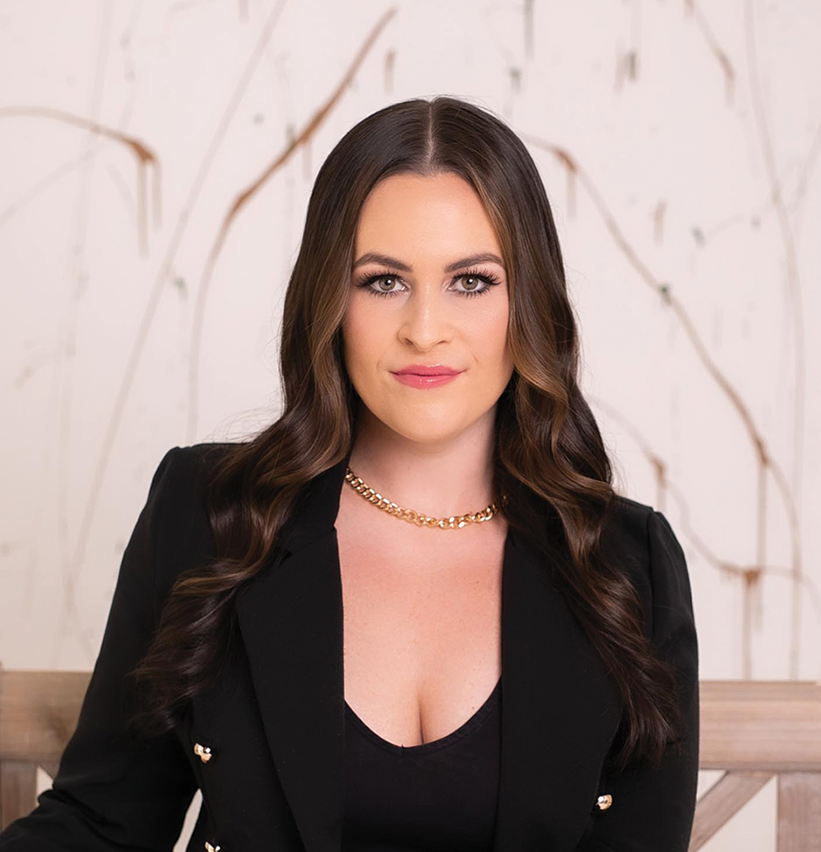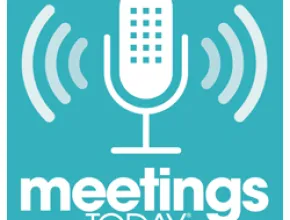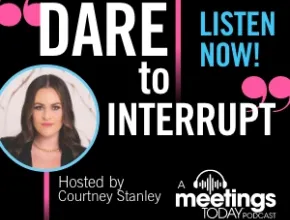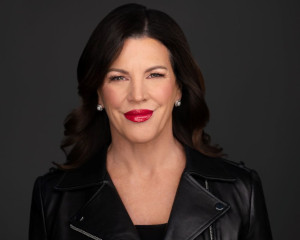
You Can Sit With Us: Standing Up to Mean Girls, Sitting in Discomfort and Honoring Your Boundaries

Season 4, Episode 3
Featured guest: Lisa Messina, Chief Sales Officer, Las Vegas Convention & Visitors Authority
Do you stand up for yourself when the moment calls for it? Lisa Messina, chief sales officer at the Las Vegas Convention & Visitors Authority, shares her experience and perspective on workplace bullying, choosing to be zealous over jealous, and finding the courage to get comfortable with uncomfortable conversations.
Listen:
Podcast sponsored by Myrtle Beach Convention Center.

Listen to more Dare to Interrupt podcasts: www.MeetingsToday.com/Dare-to-Interrupt.
Meet our guest:
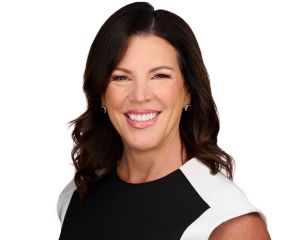
Lisa Messina embarked on a career in the hospitality business over 30 years ago. She was intentional about pursuing a path in hospitality beginning with specific jobs she held in high school and eventually her choice in college.
She has enjoyed living in 16 different cities in her life and taking the greatest memories from each to build a fun and full life. She has held sales leadership positions with global hospitality brands such as Hilton, Hyatt and Wyndham in major markets such as Washington, D.C., New York and Chicago.
She was chief marketing officer at ConferenceDirect. She led sales for Caesars Entertainment and now after living in Las Vegas for 13 years she has utilized her well rounded experience to be the first-ever chief sales officer for the Las Vegas Convention & Visitors Authority.
Lisa's social media links:
LinkedIn
Instagram: @lisamessina73
Facebook
Website
More about our host:
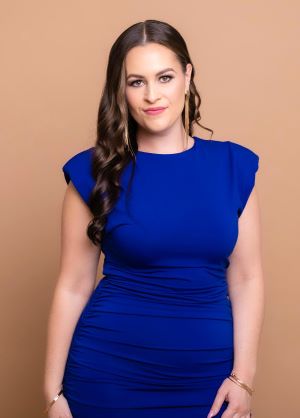 Courtney believes that transforming past experiences into impactful conversations through raw, authentic storytelling challenges the status quo, connects people from all walks of life and results in great change for the world.
Courtney believes that transforming past experiences into impactful conversations through raw, authentic storytelling challenges the status quo, connects people from all walks of life and results in great change for the world.
- Courtney is the youngest member to have ever been elected to Meeting Professionals International’s (MPI) International Board of Directors
- She is the recipient of Smart Meetings’ Entrepreneur Award, MeetingsNet’s Changemaker Award, the Association for Women in Events (AWE) Disruptor Award, the MPI Chairman’s Award and MPI RISE Award.
- Named Collaborate and Connect Magazine’s 40 under 40 and a Meetings Today Trendsetter.
- Recognized as one of the event industry’s most impactful change-makers.
- Serves on the Events Industry Sexual Harassment Task Force, AWE’s Board of Directors, MPI’s Women’s Advisory Board, is a Meetings Mean Business Ambassador and is the co-founder of the award-winning movement, #MeetingsToo.
- Named as a 2020 Meetings Trendsetter by Meetings Today
Connect with Courtney:
Transcript:
Editors note: The following transcription was facilitated by AI program Otter.ai and proofed by our editors. Although it is very accurate, there inevitably will be some mistakes, so please consider that when reading. Thank you.
Courtney Stanley
This podcast is brought to you by Myrtle Beach Convention Center.
Hello, everybody. This is Courtney Stanley, and welcome to another exciting episode of Dare to Interrupt, a listening experience where you have the opportunity to sit in on honest, unfiltered conversations with leaders who are considered to be the most influential, inspiring and innovative leaders in the world of events, hospitality, business and beyond.
Throughout their careers, these leaders have dared to interrupt conversations, their own comfort zones and sometimes even societal norms to hustle toward their greatest levels of success. I am thrilled to introduce you to today's guest.
Here with us we have Lisa Messina, chief sales officer at the Las Vegas Convention and Visitors Authority. Lisa, it's so great to have you here with us today. How are you, sister?
Lisa Messina
I am doing fabulous. How are you doing?
Courtney Stanley
I'm doing great. And you were saying that you just got back from a ski trip?
Lisa Messina
I absolutely did. One of the great pleasures of living in Southern Nevada is we have so many places to play around here on a long weekend. So, my husband and I hopped up to Park City for some skiing and some sunshine. So, it was pretty awesome.
Courtney Stanley
That sounds amazing. Would you say that you are a big outdoors person?
Lisa Messina
I definitely am. And that is one of the balances of everything Las Vegas has to offer. But then also having all those outdoor elements. Love being outside, getting that fresh air helps clear my mind so I can do a better job at work.
Courtney Stanley
Yeah, it's definitely important. I feel the same way. I feel like fresh air and sunshine and just moving my body makes all the difference. And honestly, I don't think I have really ventured off the Strip. And I go to Vegas, at least, you know, three, four times a year for work. I need to get out. I need to get off the Strip and go check out some of the cool areas in the surrounding...
Lisa Messina
I welcome you as my guest and [will] take you on a nice hike. I absolutely enjoy it.
Courtney Stanley
Well, I will definitely take you up on that. And I'm so excited to have you in our chat today. I want to give the audience an opportunity to just get to know you a little bit better.
Would you give us a summary of your career journey, where you started when you entered the industry with intention, and where you are today?
Lisa Messina
Yes, absolutely. Well, I grew up in central New Jersey, into a family that half of which were restaurateurs. So, this is a path that I have been quite intentional about following, starting as early as 12 years old when I could work in our family restaurants.
But I went and got many different positions and jobs in high school, went to a hotel school program.
And then was very plotted out as far as conquering the world and traveling and living in different cities and having different experiences with everything from small-market, major-market, large hospitality brands, and then coming to Las Vegas 13 years ago, where I have held the position of chief marketing officer with ConferenceDirect.
I oversaw the global intermediary team at Hilton Worldwide and was also then head of sales at Caesars Entertainment.
And now all of that well-rounded experience has landed me where I am today as the chief sales officer for the Las Vegas Convention and Visitors Authority. And I'm just so proud to have the job. It's the first time they've ever had a chief sales officer position. And I think the path that I've taken to get here made me a good candidate for this role, because I can really understand the needs of customers of all shapes and sizes, as well as the community of resorts and venues that we serve.
So, it seems like a quick journey, but it's been over 30 years already. So, I'm getting up there in age.
Courtney Stanley
Yeah, you've had quite the journey. And I'm curious; what have been some of the career highlights that you've experienced throughout that path.
Lisa Messina
One of the things that I have really enjoyed about this industry is that we touch every other industry. And so not only through working for different types of companies in different types of markets and the diversity of the people that we serve.
It's just been really awesome that when you think about what we do, specifically in conventions and meetings, is we have to understand what's going on with our customer, and their business and what they're trying to achieve with their events.
And through that, you just have this plugin to the global economy, and some of the largest associations and corporations just by default, like learning who your customer is.
And so that keeps it fresh and real every day in a unique way that I don't think any other industry offers.
Courtney Stanley
I think that that's so true. And that's definitely one of the benefits. It's being part of such a global community. And weren't you just in Oman.
Lisa Messina
I participated in UFI [Global Congress], which is the global tradeshow organization for organizers and suppliers from around the world. They had their annual congress in Oman, which was quite exciting.
So, we had a small group from the LVCVA and our market here that went. We're going to be welcoming them here later this year, for their first time in North America.
So, kind of exciting. But Oman was a special trip. And I'm glad I made it.
Courtney Stanley
Tell me--I want to hear more about your experience there. What were some things that surprised you? What were some of the memories that you'll never forget from that that time?
Lisa Messina
First of all, it's a beautiful country; the people are beautiful, the landscape is beautiful.
They have a very hospitality-oriented service about them, which is really welcoming. And I think that was the greatest pleasant surprise was that you think of the Middle East, and I think the lion's share of people probably have a perception of what the Middle East is about, especially as a female traveling. And I found them to be quite progressive, friendly, innovative.
And all of that made for a really enjoyable stay, one of which was filled with the education that UFI provided. But then they also do a really special thing where they get you out into the destination, so that you can touch it culturally and feel it and smell it. And that was really, really awesome.
The team over there did a really great job. And you know this about me, so it will make you laugh a little bit. But I loved just even taking selfies with all of the beautiful people there, and especially the women.
So, it was totally Oman, strong women--strong. And that was really a pleasant surprise, to be able to just feel at home. They're in a place literally halfway around the world.
Courtney Stanley
That's incredible. And I know exactly what selfie you're talking about. I remember seeing you post it on social media, and I just thought it was the coolest photo to see. I mean, they're in this space.
That's so that's awesome, Lisa, and again, like, what a blessing it is to be part of such a cool industry where we get the opportunity to connect like that with such different cultures. Absolutely. So you've had a really impressive career journey. And even you know, I've admired you and appreciate getting to know you for years now.
But even reading your bio, before going into this conversation, there were things that I didn't know about you and just felt just so inspired and so impressed by the work that you've done, and the success that you've earned and created for yourself along the way.
And I'm sure that there have been incredible highlights in that journey. And I'm sure that there have also been really great adversities and challenges.
So, I'd love to hear about some of the more challenging professional experiences that you've had to face along the way. Yeah.
Lisa Messina
There have been a few, thankfully. Not an overwhelming amount, but ones that I think are very important to share, just because I know there are other women out there that are probably dealing with them. And it might be helpful to hear how somebody else tackled them or overcame those challenges.
I would say first and foremost, surrounding yourself with other female leaders who are cheering you on and admire your success and want to be on your team. And you know, whether they're cheering for you or they're playing side by side with you, there were moments in time where I would get very frustrated because I'm just being me.
I'm happy-go-lucky. I try to get along with everyone, and that served me well as I was growing in my career. And there were women who were absolutely intimidated by that. And, you know, I think about some of these, you know, romantic comedies that we watch on TV with like, the mean girls, and I certainly had my fair share of mean girls in my career who don't want to see you happy, they don't want to see you, you know, getting promoted.
They don't want to see that. Groups of people, specifically men who have been in charge most of my career, admiring and supporting you, they get intimidated by that. And so I've had some very interesting conversations through the past where someone would try to put me down or try to say things behind my back, and it was just like, why would you do that? What have I done to you?
And so there was a moment in time where I had to proverbially--can't even say that correctly--punch somebody in the nose for being a bully in that space. And, you know, I will never forget it.
Because basically somebody was trying to put me down and be mean, and suggest that I was being promoted or getting an opportunity at something because of how I looked instead of really what my production was and what my brain could do and things like that. And that just was really, really hurtful.
But I had to take a moment in time and be somebody I was not, which was, like I said, punch the bully back and say, "No, you're not. You're not going to treat me this way." And I'll never forget that moment in time, because it's not who I am as a human to be mean back to somebody.
But sometimes you have to stand up for yourself and just stop that dialogue. Because, you know, the person who's doing it to you isn't thinking twice about it. Whereas you are like living and breathing it and thinking, God, what did I do wrong? What could I have done better?
And it's not about you. It's being true to who you are as a human being. And being open, if there truly is something that you need coaching on, or you have to tweak and change. But when you're just being you and somebody's intimidated by that, and it's trying to take you down, you do have to stand up for yourself at times. And that's really difficult to do, because your natural self doesn't want to do that; you don't want to be mean back, you know.
So, I've had those moments in time. And then, conversely, when you're building teams, and you're trying to hold people accountable, and you're trying to be honest and share real feedback on who's right for the team and who may not be--hose difficult conversations of telling somebody from a work standpoint, like maybe this isn't the job for you; maybe this isn't the path for you. And hoping that they understand that you're doing that from a place of caring for them.
And knowing that, ultimately, you have a business to run and difficult decisions to make. And hoping that you do it in a way that you preserve that human's well-being. But at the same time, knowing that you've got to just move on with your business and have that person land where they're best suited, and that your business is moving forward to achieve the goals that you set out to do.
And those kinds of decisions are difficult because you don't want to hurt any other human, especially when you come from the hospitality business. We're in this to be kind and nice and hospitable and serve. And when you have those difficult decisions, they can really make you lose sleep at night.
So, it's that irony of balancing not being bullied and not having people cut you down and surrounding yourself with people who support you. And then understanding when you're on the other side of the coin, and you're trying to deliver honest feedback for people you work with. Doing it in a way that you preserve that human and that human spirit and not putting them down, but just trying to find the right path for them that's going to make them thrive.
Courtney Stanley
Yeah, those are two very relatable situations that you described. I want to revisit the first where you spoke about that mean girl experience and having to really address the person that believed face-to-face and head-on, and so I find what you're saying very relatable, because you and I, I think are both genuinely very nice people.
And being kind sometimes comes with those--the difficulty in having tough, not altercations, even though it was a punch in the nose--not altercations but conversations where you do have to step out of your natural comfort zone of being very kind and respectful, and you know, when they go low, we go high, but sometimes I do believe that it's going high also means understanding that we have boundaries and it is our place to communicate when somebody does cross those lines and hold people accountable for their behavior.
So, I want to go back to that situation for a second when you had to, or when you chose to, address this person. How was it received?
Lisa Messina
So, it's really interesting. The first time I've ever shared this story with other than my husband, because I think it's important to share and it's something that really hurt me when it was happening. So, this was many, many years ago.
I was a younger, up-and-coming sales leader. Again, happy-go-lucky individual, was trying to get along with a lot of different people, build relationships and network, build my mentor group and things of that nature.
And at the time, I was one of very few women in a very large group of the male leaders on the team. But they took a liking to me. They asked me to go golfing. They would ask me to have one more drink at the bar before we wrapped up for the evening after a day of long meetings, and, you know, team events and things like that. But they didn't ask this other woman.
And, you know, I think one of the reasons for that was, she wasn't as laid back and easygoing. I don't think they felt they could be themselves in front of her. And so this jealousy kind of came out of that. And so she would say things to me, alluding to the fact that she felt uncomfortable, and she didn't like that I was getting invited and she was not. And so I tried to balance that and put myself in her shoes.
But then it came to a head when we were all going to an event where we were dressed up for the evening. It was an awards gala. We were wearing some nice--call it black-tie formal--and I like to dress up just like anybody else. And I think I looked really good that night. And this woman walked up to me, Courtney, at the reception, and she looked at my chest, and she said, "Put those things back where they belong," suggesting that maybe I was showing too much skin.
And my natural self would have just like, crawled under a rock and gone back to my room. But I can tell you that there's one thing I'm not, and it's not what she was suggesting that I was--I'm highly sophisticated. I'm quite conservative. I do like to show my style at times, and I that was my moment where I had to kind of knock the bully down, right?
And so I literally said to her, "If you think my boobs are why I am where I am, then I suggest you get a boob job." And I went back to my room. And I will tell you--again, going back to that rom-com--oh, like the angels come out. And the trumpets blaring--you think triumph.
I went back to my room and I cried. Because it not only felt terrible to hear that from somebody. And then to think well, maybe she's right. And she wasn't. But then to have to be mean back and put her in her place. Right?
It felt uncomfortable for me. But it had to be done. And so, for a while I had to work with this woman, and it was eggshells. But she eventually came back and apologized to me. And she told me that if she had just handled it that way from the beginning, I think it would have just been a much better scenario.
And what do I mean by that? You know, instead of putting me down about what was making her feel uncomfortable, it's like call me and say, "Hey, you know what, I've noticed that the guys have asked you to go play golf. I noticed that the guys want you to be on their team or in their groups, when they're broken out into projects. I noticed that they like having you around. I'd like to be more like that. Do you have any recommendations for me?
You know what I mean? Versus, like, putting me down and then trying to suggest that my physical appearance was the reason. It just wasn't right, you know? And so those are the kinds of scenarios that I go, "Why, why do we do that to each other as women.
It's like, let's lift each other up and be that sisterhood, and be honest and transparent to say, "This is how I'm feeling helped me, help me achieve what you've achieved, instead of trying to put me down. You know what I mean?
Courtney Stanley
I absolutely know what you mean. And as much as that comment in that particular moment may have felt really out of character, I'm still proud of you for saying something about it now. We have to speak up, even if it's not perfect, and I love the end of the story where she actually re-approached you in a very different and vulnerable way, and was just super, super open and honest with you about where those feelings were coming from.
And it's not that you didn't know, but the fact that she acknowledged it and came back and owned it, I think that's pretty amazing. And I don't think that happens every time.
The first thing that came to mind when you shared the outcome of the story and what had happened and painted that picture for me, was the saying haters are just confused fans. She admired things about you to the point where she really envied those things, the relationships that you had built, the opportunities that you weren't getting asked to be a part of.
She was a confused fan, and that showed up in a form of throwing shade and trying to bring you down to the place where she was actually feeling and sitting.
Lisa Messina
That's exactly right. That's exactly right.
Courtney Stanley
Has this been something that you have experienced throughout your career--this mean girl culture, this mean girl behavior has been something that's been prominent in multiple situations and environments?
Lisa Messina
The good news is, it hasn't happened a lot. That's just one really memorable point in my career that I really wanted to assess and learn from.
Once that happened to me--that was probably about 15-17 years ago--once that happened, then I was just a little bit more cognizant of my surroundings, and when people would start to be passive-aggressive, and say some of the things that this woman had said earlier before that ultimate time, I was able to then dissuade those things and not allow it to get to a point for me or the other individual.
So, you know, I would laugh off things a little bit. I would try to create a space for that person to share and be vulnerable, so that they could, instead of it coming to a head, say, "This is how I'm feeling," and then use it as a turning point and a coaching point, and a mentor point, to say, "I can appreciate how you're feeling and here's how to think about that differently.
You know, it's "let your hair down and become you" and become part of the world that you're kind of throwing shade. Like you were saying: Don't push it away in anger, embrace it and become a part of it. And if it's not you, fine, you know, you don't have to be something that you're not.
But it didn't happen that much afterwards, because I think I looked for it and looked to create a different experience than that first time.
Courtney Stanley
I think that's great. And the word that comes to mind for me in this particular conversation is boundaries. Yeah, I think the more that I hear you share what your natural inclinations are, and who you are as a person and what feels uncomfortable to you, the more that I feel that we're actually very similar people.
And I do think setting boundaries, and verbalizing those boundaries, and really actively putting people in their lane when they step out and try to get into yours, is something that just doesn't necessarily come naturally to me.
And I actually--literally on the piece of paper that's next to me. So every week, I have this, you know, paper planner, of course, because--hello A type!
So I've got this paper planner here, and every week I write down different affirmations, different mental states that I want to be in for the week. And this week, I wrote I'm a boundaries queen, my actions teach people what I require and will accept.
And I, recently over the past--it's probably longer than this, but I think it's come more to the forefront over the past couple of weeks--I have made the decision to be more upfront about who I am and what type of treatment in relationships I will accept, and what my expectations are, and really communicate that to the people around me and making sure that if somebody does something or says something that I actually don't feel like is okay, and that's it's rubbing me the wrong way--it's making me resentful--that I will actually address it and flex that muscle of having those hard conversations and being more assertive.
To honor the fact that there is a survival guide that everybody has as a person and giving somebody that survival guide to have a healthy relationship with you is truly their guide to being able to grow with you in that dynamic.
Whether it's in a workplace, it's with a client, it's with a partner, it's with a friend, a family member, a lot of people struggle to set boundaries with family members. And I think that that comes back to maybe in a previous chapter, or in every year and up until today, of your life, you have allowed certain behaviors to take place until you've decided I've had enough. And then to go back and retrain people to understand these are my boundaries.
This is what I accept, to have a healthy relationship with me or a close relationship. I think it's harder with people that have certain expectations of you already, thinking this is just how she is she'll be fine with this.
So, that's been something that this story actually reminded me of. This has become much more of a priority for me and my own personal development.
Yeah, there's a there's an old Greek word called "demonium," and it refers to the fact that if you deal with conflict head on in your life, you will reach the most euphoric and best possible life to live. And so this mindset that, as you said it's setting boundaries, it might feel uncomfortable at first to set those boundaries, because you don't want people to alter a positive perception of you.
You don't want them to think, "Oh, gosh, she's putting up these guardrails and look at this, how does she think she stands on this box, and, you know, has this ability to tell me how to behave." And the reality is, if you just stand up and you say, No, this is the best way for us to have the best possible relationship, and you do that ahead of time in that uncomfortable space, it will allow for the most beautiful relationship thereafter.
Because what happens if you don't deal with the boundaries--or in this case, the conflict--if you don't resolve it, then what ends up happening is it undermines the entire relationship and undermines the trust. And you know, one of two things happen, you either just part ways and you don't deal with it--which you can't really do in business.
You can do it by breaking up with a boyfriend or something like that. You can't necessarily do it in business, you have to deal with people that you don't ultimately have the best relationship with. But it'll either happen where you know, things just disappear, and that relationship goes away entirely, or this undercurrent just undermines everything else you try to do, you know, and it's because there's this pent up resentment or anger that comes because ultimately, you didn't take the time on the front end to be in that uncomfortable space and solve the conflict.
And so again, that word, it's ancient Greek, and select people who know that I kind of live by this will laugh if they hear this podcast, like, "Oh, there she goes again." But it's called you demonium. And it's this euphoric, beautiful life that you achieve if you just take the discomfort in the beginning to resolve conflicts.
And that includes, by the way, not just punching the bully in the face, but also saying you're sorry, or you're wrong when this comes up, because that happens, too. And so, it's a two-way street.
Courtney Stanley
It definitely is. And I think there's a point that you made that I want to highlight, and that's around having the conversation upfront, and quickly.
So, yeah, I think a lot of times, you know, if it is more natural for you to kind of avoid conflict, avoid those hard conversations, it only gets worse.
So, whether you actually do need to set a boundary, or under a friendship or relationship, or just communicate that something upsets you, or whatever it is, it doesn't go away. And they're very much is, I think, such an importance in ripping the band aid off and just doing it, like flex the muscle, pump yourself up, have the conversation, do the best you can, don't expect perfection, and move forward from there because it does build such resentment.
And it is such an undercurrent in that relationship, whether or not it will always be or the relationship just kind of fades away. Right?
So, something else that you mentioned, and I want to shed some light on this, and I'm selfishly curious about what you meant by this statement, something that you mentioned prior to us hopping on today, is the loneliness of being a leader. And I just want to better understand what you mean by that.
Lisa Messina
So, I think anytime you achieve a leadership position, and it comes in all shapes and sizes, it might be in your personal life, you know, as leading your family. It could be leading a volunteer group; it could be in your work life.
I'm sitting here today as the chief sales officer. You have been put in a place, or you have put yourself in a place, to lead.
And leaders by definition tend to be less than about 10% of the population. And that's because most people have a really difficult time of making tough decisions, and especially as a female who leads with heart, especially in our industry, which is hospitality and service, you are often in this place where when you have to make the difficult decisions to achieve the goals you're trying to achieve in that leadership role.
It means that you're going to have to let the heart behind a little bit, let that hospitality behind a little bit. And know that you're going to say some things, you're going to make some decisions that are going to be unpopular. And that's a really uncomfortable space.
And you don't have the luxury when you're the leader of turning necessarily to somebody else, and talking about your why.
Because sometimes it's inappropriate, you know, if you make a tough decision, let's say that impacts your sales organization. Usually, you don't talk to your boss about that, per se, and the difficulty of that decision making that you're struggling with. Because your boss's expectation is, well, that's what I hired you for. You can't go to speak about that necessarily with the people that work for you. Because, again, they don't necessarily want to know the why, they just know that I don't like the decision that you made.
And so, it becomes a very lonely place. And, you know, you can go to a place where you say, "Well, what was the feedback of that decision," or "How is the organization feeling about that direction or that strategy," and you want to take that feedback, but ultimately, you're in this unique position as the leader because you have to balance that feedback reel, and then know that you ultimately made the right decision and sit in that discomfort. And that's really tough, right?
Because, again, like, I go back to you and I having similar personalities about wanting to please and be well liked and be happy, right? And when you're in that space, where you've called a shot, and somebody doesn't agree or dislikes it, or, you know, was negatively impacted by it, you have to know that you can't go back and just retrace it. You can't just reverse it because it was unpopular, you have to kind of rest on your laurels.
Now, if you were grossly wrong about it, Courtney, that's different, but to sit and say what I did was the right thing for my organization or my business, even if it felt uncomfortable, that can feel very lonely. And that's the part that I'm really talking about.
And so, that's where building a strong network of friends and colleagues and mentors, who don't have skin in the game, that you can talk about your decisions pre and post, you know, sharing them to say, "What are the pitfalls I haven't considered that I need to think about? What are the perceptions, the angles, the diverse people that I serve, that might have a difference of opinion than me." And then going back and getting that feedback real right after you've made the decision, as well. And sometimes you're not going to get that validation.
And so you sit there alone, and you go, "Oh, geez, I'm the most unpopular this week, the thumb button on Facebook, or the heart on Instagram didn't get tapped as many times, you know, with this decision this direction or this strategy. And that can feel like a very lonely place.
So, you know, knowing that you deal with that, and you have to find comfort in the discomfort, is something that a lot of leaders just don't talk enough about.
Courtney Stanley
Yeah, I really liked the way that you summarize that in saying sitting in the discomfort or finding comfort in the discomfort. Because it's not necessarily the discomfort, yes, will probably fade over time, but it's loud.
When you are sitting at that discomfort, it's allowed to over-analyze the decisions you make, you start to you know, dig in--well, not dig in, but the people-pleaser may creep out a little bit. And I can only assume that oftentimes people will outwardly disagree with your decision when you do have those conversations, and probably don't always have the same perspective, or maybe also projecting things that they're feeling into the decision that was being made.
I actually had a situation that was not the same as this, but definitely an example of sitting in discomfort that happened probably about a month ago. I had to make a really, really difficult decision that was extremely outside of my nature, but it needed to be made and it was truly in the spirit of setting boundaries, and really values--really appreciating and staying true to values that I felt were important for me as a person.
And when I did have the tough conversation, the feedback, oh, the feedback that I received was, "I hope you feel good about yourself." And oh man, as somebody who truly, truly, truly cares about every single person that crosses my path, whether it's a stranger or it's a family member, that really shook me, and I had to shake it off.
And that, you know, that feeling, and that hurt, definitely lingered, but I had to sit in that discomfort. And I had to recognize that I made the right decision for myself. And not everybody's going to agree, but my reasons were valid. And my feeling of you know, being hurt and also shaken by the response that had taken place was also valid.
And unfortunately, you're going to feel multiple things at once, whether you made the right decision, and you know, feel good about it. And you can also feel like crap because someone else doesn't feel good about it.
So, it's tough. I definitely hear you that making those decisions, and especially not necessarily having other people to just debrief about it, to seek input from at all times during those that decision making process. That's hard. That is lonely.
Lisa Mesina
It is. It is.
Courtney Stanley
Yes, yes, yes. Well, Lisa, we are about at the end of our conversation here and I feel like I've learned so much from you today. And I definitely feel like I could talk for easily a couple extra hours with you.
But I want to give you some space to share any final words of wisdom or pieces of advice with the other people who are listening to this podcast. It's mostly women--we are in women's history month right now. We are just past International Women's Day.
So, any piece of advice that you want to leave our listeners with?
Lisa Messina
I think one of the best ways to sum it up is don't be jealous, be zealous about supporting women that you admire, surround yourself with those that you admire, and say thank you and be grateful for something that a female leader did that impacted you in a positive way.
And if you're sitting on the sidelines, feeling outside of, you know, that zealous support, you know, figure out a way to overcome the jealousy and the separation, and become a part of that stronger community. Because we all will help each other rise up and be a driving force in business ownership and leadership and C-suite positions.
If we can get past, you know, that jealousy piece and realizing that we rise together.
So, I would say, again, you know, don't be jealous, be zealous of supporting some women that you admire, become part of that group. Don't alienate yourself from that, because together we will all rise.
Courtney Stanley
I think that is the perfect message to lead with, especially during this time where we are taking an extra moment to recognize the women around us that truly have inspired us and have made such an impact on our journeys and on their communities.
So, I love that message. And I want to thank you so much, Lisa, for sharing your stories with us today. You definitely made me laugh, and all of your knowledge and your wisdom and your expertise and audience.
I want to thank you all for listening. Share what you learned from this episode with us on Twitter, Facebook and Instagram by following at #MeetingsToday and at #CourtneyonStage, and be sure to never miss an episode by subscribing to Dare to Interrupt on Apple podcasts, Spotify, Stitcher, Google Podcasts and more.
Be bold, be zealous and keep daring to interrupt my friends. Until next time.


